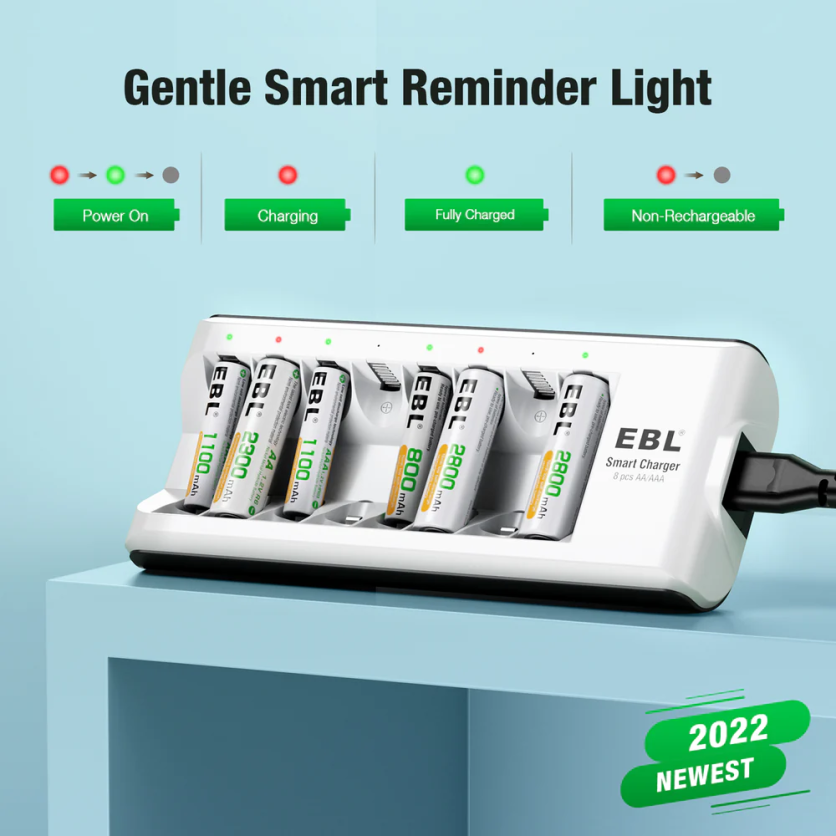Introduction to EBL: A Trusted Brand in Battery Technology
In today's digital world, where electronic devices are essential in everyday life, reliable and long-lasting power sources are a necessity. Whether it's for household gadgets, cameras, flashlights, or gaming controllers, the demand for rechargeable batteries is growing rapidly. EBL is a leading brand in the battery and charging industry, known for its innovative and high-quality energy solutions.
Founded with the mission to provide efficient, eco-friendly, and cost-effective power options, EBL specializes in rechargeable batteries, chargers, and energy storage solutions. Their products cater to both professional and everyday users, ensuring longer battery life, faster charging, and enhanced safety features. Two of their standout products—the EBL 1.5V AA AAA Lithium-Ion Battery Charger and the EBL 808 Ni-MH Battery Charger—offer different charging technologies suited for various needs.
To better understand these two products, let's explore the key differences between Nickel-Metal Hydride (Ni-MH) batteries and Lithium-Ion (Li-Ion) batteries, helping you make an informed choice based on your requirements.

What Are Ni-MH and Li-Ion Batteries?
Ni-MH (Nickel-Metal Hydride) Batteries
Ni-MH batteries have been widely used for decades as an improved version of older Nickel-Cadmium (Ni-Cd) batteries. These batteries are known for their high capacity, environmental friendliness, and cost-effectiveness.
Key Features of Ni-MH Batteries:
- Rechargeable & Cost-Effective – Unlike disposable batteries, Ni-MH batteries can be recharged hundreds of times, saving money in the long run.
- High Energy Density – They can store a significant amount of energy, making them ideal for high-drain devices like cameras, remote controls, and toys.
- Eco-Friendly – They do not contain toxic cadmium, making them safer for the environment.
- Self-Discharge Rate – While they discharge slowly when not in use, advancements in technology have improved their retention.
- Commonly Used in – Flashlights, wireless keyboards, cordless phones, and gaming controllers.
Li-Ion (Lithium-Ion) Batteries
Li-Ion batteries have gained popularity in recent years due to their high energy density, low self-discharge, and longer lifespan. These batteries are commonly found in smartphones, laptops, electric vehicles, and high-performance electronics.
Key Features of Li-Ion Batteries:
- Higher Voltage Output – Li-Ion batteries operate at 1.5V per cell, providing more stable power output compared to Ni-MH (1.2V).
- Longer Lifespan – With proper usage, Li-Ion batteries last longer and maintain capacity over extended periods.
- Faster Charging – These batteries charge more efficiently and can retain power for longer durations.
- Low Self-Discharge Rate – They hold their charge much better than Ni-MH, making them ideal for emergency devices.
- Commonly Used in – Digital cameras, drones, portable speakers, medical equipment, and power tools.
Comparing Ni-MH and Li-Ion Batteries: Pros and Cons
| Feature | Ni-MH Batteries | Li-Ion Batteries |
| Voltage Output | 1.2V per cell | 1.5V per cell |
| Energy Density | Moderate | High |
| Self-Discharge Rate | Higher (10–20% per month) | Lower (2–5% per month) |
| Charging Speed | Slower | Faster |
| Lifespan | 500–1000 charge cycles | 1000+ charge cycles |
| Weight | Heavier | Lighter |
| Cost | More affordable | Higher price |
| Environmental Impact | More eco-friendly | Less eco-friendly due to lithium extraction |
Each battery type has its strengths and weaknesses, which makes them suitable for different applications.
EBL's Advanced Charging Solutions
To get the most out of these battery technologies, having a reliable charger is crucial. EBL offers specialized chargers for both Ni-MH and Li-Ion batteries, ensuring fast, safe, and efficient charging.
1. EBL Battery Charger with 1.5V AA AAA Li-Ion Batteries
This smart charger is designed for 1.5V lithium-ion rechargeable batteries, providing quick and consistent power to high-drain devices.
Key Features:
- Fast Charging – Charges Li-Ion batteries quickly, minimizing downtime.
- Smart Protection System – Protects against overcharging, overheating, and short circuits.
- USB Charging – Convenient for charging on-the-go via power banks, laptops, and USB adapters.
- Stable Power Output – Ensures a constant 1.5V, perfect for high-performance electronics.
2. EBL 808 Charger for Ni-MH AA & AAA Batteries
This charger is specifically designed for Ni-MH rechargeable batteries, offering an eco-friendly and budget-friendly solution.
Key Features:
- 8-Bay Charging Capacity – Allows multiple batteries to be charged at once, ideal for heavy users.
- Automatic Shutoff – Prevents overcharging, extending battery life.
- LED Indicators – Displays charging status for easy monitoring.
- Universal Compatibility – Works with standard AA and AAA Ni-MH batteries.
Which Battery Type Should You Choose?
The evolving landscape of green solutions and battery innovations has led to significant advancements in rechargeable battery technology. Both Ni-MH and Li-Ion batteries have distinct advantages depending on the application. While Ni-MH batteries are often preferred for their affordability and eco-friendliness, Li-Ion batteries offer higher energy density and longer lifespan. As industries seek more efficient and sustainable power sources, ongoing developments continue to improve battery performance, safety, and reliability.
- For daily household devices (remote controls, clocks, toys) → Ni-MH batteries are a great, cost-effective option.
- For high-performance devices (digital cameras, flashlights, drones) → Li-Ion batteries offer better power stability and efficiency.
- If you need long shelf life (emergency flashlights, backup power) → Li-Ion batteries have lower self-discharge rates.
- If you prefer budget-friendly and eco-conscious choices → Ni-MH batteries are the way to go.
Regardless of your choice, using EBL's high-quality chargersensures safe, efficient, and long-lasting battery performance.
Conclusion: Powering the Future with EBL
As battery technology continues to evolve, Ni-MH and Li-Ion batteries remain two of the most widely used rechargeable options. With the increasing focus on sustainability and Green Energy Solutions, rechargeable batteries are a step toward reducing electronic waste and promoting energy efficiency. Each has its unique advantages, making them suitable for different applications. EBL's commitment to innovation provides consumers with high-performance batteries and smart charging solutions tailored to modern needs.
Whether you're looking for a cost-effective rechargeable battery system (Ni-MH) or a high-performance, long-lasting power source (Li-Ion), EBL offers reliable products that deliver efficiency, safety, and convenience.





